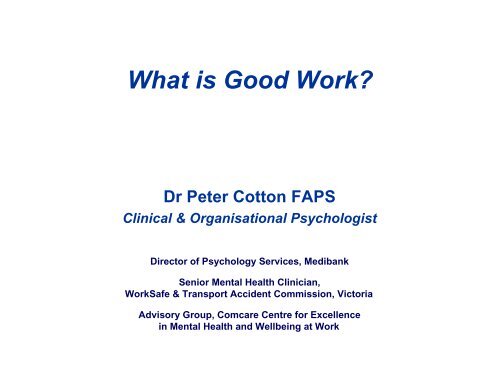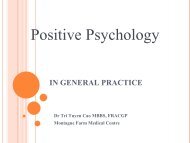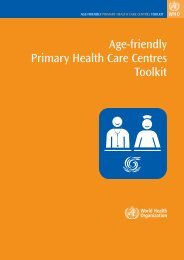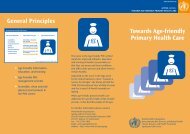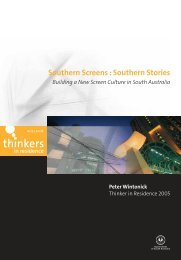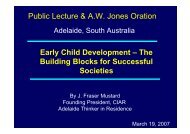What is Good Work?
What is Good Work?
What is Good Work?
Create successful ePaper yourself
Turn your PDF publications into a flip-book with our unique Google optimized e-Paper software.
<strong>What</strong> <strong>is</strong> <strong>Good</strong> <strong>Work</strong><br />
Dr Peter Cotton FAPS<br />
Clinical & Organ<strong>is</strong>ational Psycholog<strong>is</strong>t<br />
Director of Psychology Services, Medibank<br />
Senior Mental Health Clinician,<br />
<strong>Work</strong>Safe & Transport Accident Comm<strong>is</strong>sion, Victoria<br />
Adv<strong>is</strong>ory Group, Comcare Centre for Excellence<br />
in Mental Health and Wellbeing at <strong>Work</strong>
The Problem of ‘D<strong>is</strong>cretionary Absentee<strong>is</strong>m’<br />
© 2012 Dr Peter Cotton Email: peterc@cottonocp.com.au<br />
• Requests for GP sickness certification have increased by 70<br />
percent over the past nine years in Australia.<br />
• D<strong>is</strong>ability Support Pension <strong>is</strong> currently the fastest growing<br />
welfare benefit in Australia (800,000+ individuals).<br />
• DSP growth <strong>is</strong> predominantly in milder health and mental health<br />
problems (e.g., chronic musculoskeletal pain, anxiety and<br />
depression)
© 2012 Dr Peter Cotton Email: peterc@cottonocp.com.au<br />
“Real<strong>is</strong>ing the Health Benefits of <strong>Work</strong>”<br />
The Australasian Faculty of Occupational and<br />
Environmental Medicine (AFOEM) position statement<br />
presents international and Australasian evidence<br />
that:<br />
– “work <strong>is</strong> generally good for health and wellbeing, and<br />
– that long term work absence, work d<strong>is</strong>ability and<br />
unemployment generally have a negative impact on health<br />
and wellbeing”<br />
– “Medically unnecessary d<strong>is</strong>ability” Chr<strong>is</strong>tian ACOEM (2006)<br />
– “Fit note” Black (2009)
© 2012 Dr Peter Cotton Email: peterc@cottonocp.com.au<br />
The Australasian Consensus Statement on<br />
the Health Benefits of <strong>Work</strong><br />
• Supported by more than 80<br />
signatories including the<br />
Royal Australian College<br />
of GPs<br />
• A call to action to promote<br />
awareness of the health<br />
benefits of work
© 2012 Dr Peter Cotton Email: peterc@cottonocp.com.au<br />
‘Bad <strong>Work</strong>’ <strong>is</strong> not <strong>Good</strong> for Mental Health !<br />
• Study involving 7,155 respondents.<br />
• Overall, unemployed respondents had poorer mental health than<br />
those employed.<br />
• However, the mental health of unemployed individuals was<br />
comparable or better than individuals in bad jobs (i.e., very ‘poor<br />
psychosocial quality’ jobs = low control, high demands and<br />
complexity, job insecurity and unfair pay).<br />
Butterworth, et al (2011)
© 2012 Dr Peter Cotton Email: peterc@cottonocp.com.au<br />
Background<br />
• 10 year Organ<strong>is</strong>ational Health research program<br />
based at the University of Melbourne<br />
• Research team led by Prof Peter Hart<br />
• National Health & Medical Research Council<br />
funding<br />
• Focus on key drivers of staff motivation, wellbeing<br />
and performance outcomes
The Organ<strong>is</strong>ational Health Framework …<br />
Emotionality<br />
+<br />
+<br />
+<br />
Psych<br />
Injury<br />
Emotion<br />
Focused<br />
Coping<br />
+<br />
Problem<br />
Focused<br />
Coping<br />
_<br />
+<br />
+<br />
Org.<br />
Climate<br />
+<br />
_<br />
+<br />
Negative<br />
Experiences<br />
Positive<br />
Experiences<br />
+<br />
+<br />
+<br />
_<br />
+<br />
_<br />
+<br />
_<br />
D<strong>is</strong>tress<br />
Job<br />
Sat<strong>is</strong>faction<br />
_<br />
Morale<br />
Non certified<br />
Sick leave<br />
Turnover<br />
Intentions<br />
D<strong>is</strong>cretionary<br />
Performance<br />
Customer<br />
Experience<br />
+<br />
+<br />
+<br />
Performance<br />
Sociability<br />
Based on Hart & Cooper (2001)
Organ<strong>is</strong>ational Health research<br />
© 2012 Dr Peter Cotton Email: peterc@cottonocp.com.au<br />
Measuring organ<strong>is</strong>ational health indictors across a range of<br />
industry sectors...<br />
Public Sector<br />
Private Sector<br />
Accountants and Econom<strong>is</strong>ts<br />
Community Services <strong>Work</strong>ers<br />
Emergency Services <strong>Work</strong>ers<br />
Hospital Staff<br />
Local Government Employees<br />
Police Officers<br />
Primary & Secondary Teachers<br />
TAFE Employees<br />
Technical/Scientific Staff<br />
Airline Employees<br />
Engineering Employees<br />
Finance Sector Employees<br />
Information Technology Employees<br />
Insurance Employees<br />
Resource Industry Employees<br />
Retail Employees<br />
Telecommunications Employees<br />
Utilities Employees
© 2012 Dr Peter Cotton Email: peterc@cottonocp.com.au<br />
Key Initial Findings<br />
• Reporting of stress in the workplace <strong>is</strong> not<br />
necessarily caused by increased d<strong>is</strong>tress – but can<br />
also be caused by a lack of positive work<br />
experiences and positive emotions<br />
(Cooper & Hart, 2001)
© 2012 Dr Peter Cotton Email: peterc@cottonocp.com.au<br />
An Organ<strong>is</strong>ational Health Model ...<br />
Leadership<br />
Behaviours<br />
<strong>Work</strong> Team<br />
Climate<br />
Employee<br />
Morale<br />
& Motivation<br />
Business<br />
Performance<br />
Staff<br />
Wellbeing
© 2012 Dr Peter Cotton Email: peterc@cottonocp.com.au<br />
The Structure of Occupational Wellbeing<br />
Mental<br />
Health D<strong>is</strong>orders<br />
Job<br />
Sat<strong>is</strong>faction<br />
Resilience<br />
D<strong>is</strong>tress<br />
Morale<br />
Psychological Injury<br />
Flour<strong>is</strong>hing
© 2012 Dr Peter Cotton Email: peterc@cottonocp.com.au<br />
Key Drivers of Staff Motivation and Wellbeing<br />
Appra<strong>is</strong>al & Feedback<br />
Causes<br />
Teamwork<br />
Professional Development<br />
Goal Alignment<br />
Participative Dec<strong>is</strong>ion-Making<br />
Role Clarity<br />
60% of Individual Morale<br />
80% of <strong>Work</strong>group Morale<br />
80% of <strong>Work</strong>group D<strong>is</strong>tress<br />
30% of Individual D<strong>is</strong>tress<br />
Supportive Leadership<br />
<strong>Work</strong> Demands<br />
Explains
The Critical Role of Morale<br />
© 2012 Dr Peter Cotton Email: peterc@cottonocp.com.au<br />
‣ Higher levels of morale increase resilience and buffer<br />
employees against the impact of operational stressors.<br />
‣ Levels of morale are strongly influenced by supportive<br />
leadership and the quality of work team climate.
© 2012 Dr Peter Cotton Email: peterc@cottonocp.com.au<br />
Effective leader behaviours …<br />
Focus on<br />
People<br />
Focus on<br />
Development<br />
Focus on<br />
Core Business<br />
Supportive<br />
Leadership<br />
Manages People<br />
Coaches Staff<br />
Builds Own Skills<br />
Being approachable<br />
Seeks Feedback<br />
Builds<br />
Relationships<br />
Supports Staff<br />
Effectively<br />
Manages Change<br />
Values Training<br />
& Development<br />
Is Entrepreneurial<br />
Creates a Quality<br />
Environment<br />
Provides Direction<br />
Knowing the<br />
problems staff face<br />
Supporting staff<br />
Role modeling<br />
Proactive engagement<br />
Effectively<br />
Manages<br />
Projects
Leadership Styles and Psychosocial R<strong>is</strong>k<br />
© 2012 Dr Peter Cotton Email: peterc@cottonocp.com.au<br />
Lia<strong>is</strong>sez-Faire<br />
Leader as<br />
Technical Adv<strong>is</strong>or<br />
Popular<br />
Leader<br />
Excessively<br />
Directive<br />
Leader<br />
Team Environment:<br />
Team Environment:<br />
Team Environment:<br />
Low support<br />
Low clarity<br />
Low Engagement<br />
Don’t communicate views<br />
about important <strong>is</strong>sues<br />
Neglect Feedback<br />
Fail to follow up on<br />
requests for ass<strong>is</strong>tance<br />
Avoidance of leadership<br />
responsibilities<br />
High Support<br />
Lower Clarity<br />
Focus on positive<br />
interpersonal<br />
relationships<br />
Don’t address<br />
behavioural <strong>is</strong>sues<br />
Neglect performance<br />
management<br />
Avoid tough<br />
conversations<br />
High Clarity<br />
Low Support<br />
Low engagement<br />
Poor communication<br />
Neglect of<br />
Developmental Feedback<br />
Over-emphas<strong>is</strong> on<br />
Corrective Feedback<br />
Perceived Stigma About<br />
Reporting Personal<br />
Problems
Underpinning of <strong>Work</strong> Psychosocial Quality<br />
Empathy<br />
•Trustworthy<br />
•Even-handed<br />
•Understanding<br />
•Proactive<br />
Clarity<br />
•Clear goals<br />
•Micro &<br />
Macro<br />
Objectives<br />
•Delegations<br />
Engagement<br />
•Dec<strong>is</strong>ion-<br />
Making<br />
•Goal Alignment<br />
•Teamwork<br />
Learning<br />
•Feedback<br />
•Coaching<br />
•Development<br />
© 2012 Dr Peter Cotton Email: peterc@cottonocp.com.au
© 2012 Dr Peter Cotton Email: peterc@cottonocp.com.au<br />
Why the psychosocial quality of work <strong>is</strong> so important …<br />
Wellbeing &<br />
Motivation<br />
Loyalty<br />
Behaviours<br />
Retention<br />
Absence<br />
Cost<br />
Customer<br />
Experience<br />
Business<br />
Performance<br />
80% 60% 25% 15% 50%<br />
30%<br />
the leader and cultural behaviours that form the foundations of engagement and performance<br />
Four Pillars of Leader and Cultural Behaviour<br />
Clarity<br />
Empathy<br />
Learning<br />
Engagement


